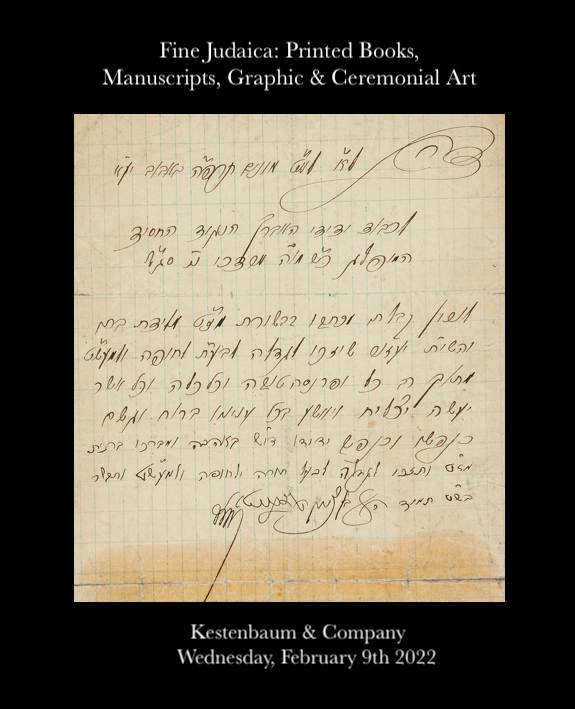(Head of Kollel Oesterreich-Galicia, author of Responsa Maharya HaLevi, 1827-1891). Autograph Letter Signed written in Hebrew to Rabbi Moshe (Chara’g) Zeiger.

Auction 96 |
Wednesday, February 09th,
2022 at 1:00pm
Fine Judaica: Printed Books, Manuscripts, Rabbinic Letters, Ceremonial & Graphic Art
Lot 25
ETTINGER, ISAAC AARON SEGAL
(Head of Kollel Oesterreich-Galicia, author of Responsa Maharya HaLevi, 1827-1891). Autograph Letter Signed written in Hebrew to Rabbi Moshe (Chara’g) Zeiger.
Lemberg: 3rd Menachem Av 1871
Est: $800 - $1,200
PRICE REALIZED $900
In the 19th century, Jewish communities in Eretz Yisrael were supported through “Kollelim” – organizations that raised funds from a specific locale and distributed them to Jews in Eretz Israel who originated in those locales.
In response to perceived discrimination by the Russian Kollel, a new organization, Kollel Oesterreich, was established for communities of Austrian Jews in Eretz Yisrael, most of whom were from Galicia and Bukovina. Presiding over this new Kollel were R. Mordechai Zev Itinga of Lvov, who was responsible for Western Galicia, and R. Chaim of Kossov, responsible for Bukovina and Eastern Galicia. When R. Chaim passed away in 1854, his sons disagreed over succession, leading to the formation of two kollelim, Kollel Vizhnitz and Kollel Kossov, in addition to R. Mordechai Zev’s Kollel Galicia, all operating under the umbrella of Kollel Oesterreich, which was also helmed in Lvov by R. Mordechai Zev. Upon his death in 1863, R. Mordechai Zev’s positions passed to his son, R. Yitzchak Aharon.
From the outset, there was tension between the different constituent parts of Kollel Oesterreich regarding the rights to monies collected in various territories. The appointment of R. Yissachar Dov Berish Lustman, who had moved from Sanok, Galicia, to Tzefat and was closely associated with the Lvov faction, to oversee Kollel Oesterreich and the disbursement of its funds, caused tensions to flare. Especially acute was the dispute between the Lvov faction and Kollel Vitznitz communities in Tzefat and Teveryah, then administered by Rabbi Moshe (Chara”g - Chathan Rabbi Gavriel) Zeiger. Adding fuel to the fire was the involvement of the Austrian consuls to Jerusalem and Beirut.
In its time, this now-forgotten dispute produced hundreds of letters, pamphlets, and broadsides, and it lasted nearly two decades!
This letter, penned in 1871, was from R. Yitzchak Aharon Itinga to R. Moshe Chara’g, two of the principal actors in this drama, and it mentions R. Berish Lustman, the Austrian consul, and various funds to be disbursed. R. Itinga tries to allay R. Chara”g’s concerns that R. Lustman was not acting in good faith and appeals to R. Chara’g to act for the honor of Eretz Israel and not raise tensions further.
